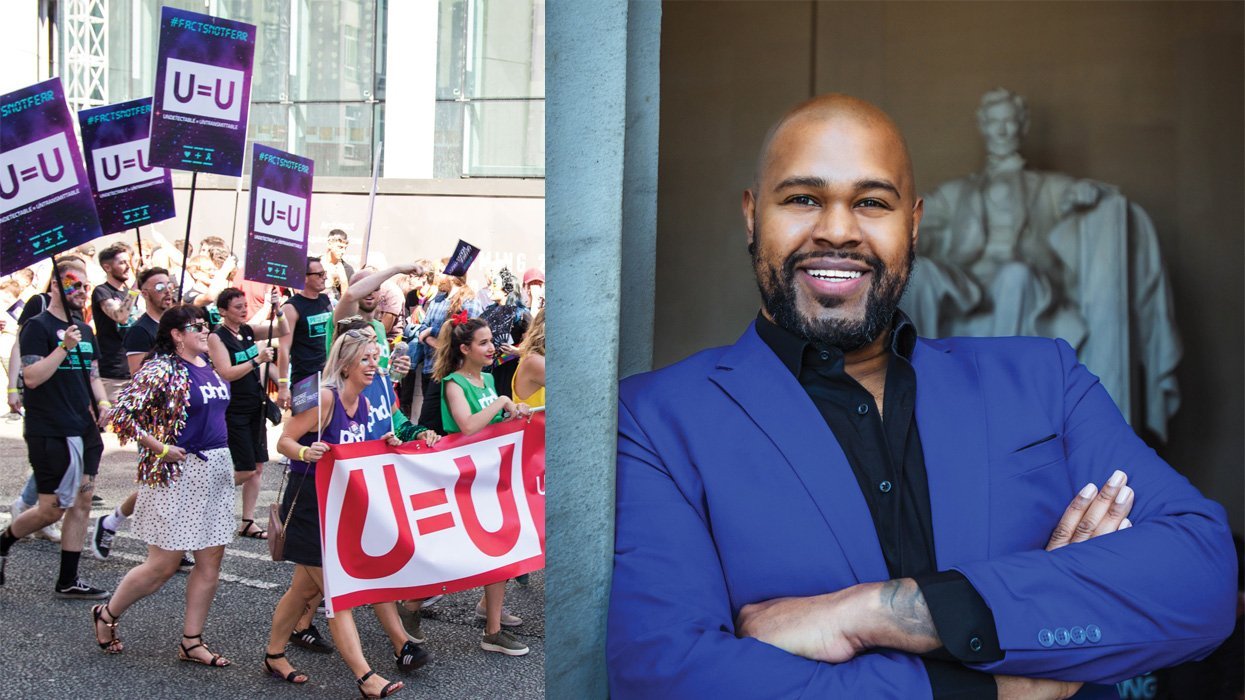
Treatment GuideJust DiagnosedSex & DatingAfrican AmericanStigmaAsk the HIV DocPrEP En EspañolNewsVoicesPrint IssueVideoOut 100
CONTACTCAREER OPPORTUNITIESADVERTISE WITH USPRIVACY POLICYPRIVACY PREFERENCESTERMS OF USELEGAL NOTICE
© 2024 Pride Publishing Inc.
All Rights reserved
All Rights reserved
By continuing to use our site, you agree to our Private Policy and Terms of Use.
Casual conversations, as it turns out, can have an enormous impact on HIV prevention outreach. At least that is how the seeds of an unprecedented multimillion-dollar campaign were sown at media giant Viacom, which owns television networks CBS, UPN, Showtime, Sundance, MTV, Nickelodeon, Black Entertainment Television, and others; more than 200 individual television affiliates; more than 180 Infinity radio stations in the nation's top 50 markets; numerous outdoor advertising venues; book publisher Simon & Schuster; and Blockbuster video stores. At a quarterly meeting of the Viacom division heads held in August 2001 in New York, executives from BET and MTV began to chat with their colleagues about their networks' HIV education efforts. At BET the ongoing campaign is called 'Rap It Up'; at MTV, 'Fight for Your Rights: Protect Yourself.' Projects are targeted at African-Americans and youth respectively on each network. The campaigns include public-service announcements, special HIV-related programming, a Web site, and toll-free telephone hotline numbers. 'We decided we had to do something because the numbers of African-Americans getting infected were just astounding,' says Kelli Richardson-Lawson, BET's executive vice president for marketing and communications, of the network's campaign, which began in 2000. 'Because we're in 74.5 million homes and have so many eyeballs watching us, we decided we were the perfect place to start getting the word out to get people to be safe and smart.' Viacom president Mel Karmazin was so impressed by the projects that he and his fellow executives began discussing how every Viacom unit could similarly address HIV prevention and disseminate information, notes Imara Jones, who is director of Viacom's initiative on HIV. A year and a half after the idea was first green-lit, Viacom's 'Know HIV/AIDS' was launched on January 6 with a flurry of public-service announcements'and national press coverage. More Bang for the Buck For this year alone Viacom has pledged more than $120 million in advertising time to the effort, which includes 49 targeted television, radio, and outdoor billboard and transit ads. PSAs also are running in 5,500 of the company's Blockbuster stores. Jones says the ads include those aimed at specific high-risk groups'such as a series of PSAs directed by filmmaker Joel Schumacher targeting men who have sex with men and another featuring Mo'Nique, star of the UPN sitcom The Parkers, directed toward African-American women'as well as more broadly targeted informational spots. The campaign also features radio messages and outdoor advertisements, some of which appear in Spanish. BET devoted $556,000 in TV ad time during the first week alone, according to Richardson-Lawson. And she notes that the ads are not relegated to middle-of-the-night time slots; most run during prime viewing hours. 'Obviously that's a huge value in terms of monetary resources, but we think what we're doing is critical, and we're very proud to take the lead,' she says of the blitz of public-service spots. Every advertisement in the campaign includes the number of a toll-free telephone information and referral hotline established for the project as well as the Web address of a site created for the initiative, which can be seen online at www.knowhivaids.org. Informational booklets published by Simon & Schuster also are available. A Little Help From Friends Viacom officials organized the vast outreach program in conjunction with the Henry J. Kaiser Family Foundation, a public education and health policy organization that helped develop the BET and MTV campaigns, says Matt James, a senior vice president at Kaiser. The media company approached Kaiser early on for guidance in crafting effective prevention messages'and also to tap Kaiser's medical and scientific expertise. 'They told us that they wanted to focus on what's happening domestically because AIDS isn't taken as seriously here as it used to be,' James notes. 'They also wanted to go beyond lecturing people about the need to protect themselves and get them to act on the information, to take the next step and change their behaviors or get tested.' Recognizing the enormous reach a Viacom-wide initiative could have, Kaiser officials eagerly became active partners in the project and spearheaded a less obvious component of the effort that might nevertheless be the most far-reaching'the inclusion of HIV plot lines in several Viacom-owned television sitcoms and dramas. Kaiser officials conducted in-depth educational seminars for the creative staffs and producers of the programs, covering everything from the sheer numbers of the global pandemic to the U.S. demographic groups that are experiencing surging HIV infection rates. Made for the Masses The information struck a chord, and many of the creative teams penned AIDS-related story lines for their shows. Nine television series'each with millions of viewers'on CBS, UPN, and Showtime have already completed episodes, with more programs expected to follow throughout the year, Jones says. Some of the shows, including CBS's Becker and UPN's Enterprise, Half & Half, and One on One, aired the episodes during the critical February 'sweeps' month, when the networks seek the highest possible viewership. The producers and writers for Becker, starring Ted Danson as an acerbic physician practicing in the Bronx, N.Y., walked away from the Kaiser briefing with a sense of shock over data showing American youths are increasingly becoming infected with the virus. 'There are a lot of strange misconceptions out there,' says series co' executive producer Russ Woody. 'And there is apparently an alarming lack of condom use among young people despite a lot of sex happening. You'd think at this stage of the game people would have been inundated with safer-sex information, especially young people. But we were surprised to find there's a large percentage of young people who have misperceptions about it and a casualness that AIDS is not as much a threat as it is.' Although Becker tends to attract an older TV audience, the show's writing team put together an episode that aired on February 2 that dealt with a sexually active 15-year-old who has an extremely cavalier 'it can't happen to me' attitude about HIV. Woody says he not only sought to reach young viewers with the safer-sex episode but hopes the program's message will resonate with their older family members as well. 'If it points out a few things to either parents or kids,' he says, 'it could do a lot of good.' UPN's One on One writers and producers also aimed to be provocative with the February 10 episode of their sitcom, which is one of the most watched shows in African-American households. Eunetta Boone, One on One's creator and one of its executive producers, says statistics showing that HIV is disproportionately affecting minority communities, particularly in Baltimore, where the program is set, made it 'evident that we had to address this.' The resulting episode focused on main character Flex Washington'played by Flex Alexander'who takes his first HIV antibody test at the insistence of his girlfriend. Flex, a former NBA star turned sportscaster who is something of a womanizer, looks back at his sexual history and admits that by not getting tested he may have put his sex partners at risk. Food for Thought Boone and her colleagues hope that having the program's main character express concern over his prior indifference toward being tested will prompt viewers'particularly sexually active men who may not be practicing safer sex'to also reevaluate their behaviors. 'What we're hoping to do is convince people who are going to have sex to get tested and to tell other people that you're not a punk if you wear a rubber, that you're not a punk if you want to be responsible,' she explains. Responsibility is a key theme of much of the 'Know HIV/AIDS' project. Its first PSAs hit the airwaves urging women not to leave the decision whether to use condoms when having sex up to the man. Other ads encourage open communication between sex partners about sexual health and advocate getting the facts about HIV and safer sex. Every ad is geared toward compelling viewers or listeners to act'to begin practicing safer sex, to get tested for HIV antibodies, and to help erase the stigma still wrongly assigned to HIV-positive people, according to the 'Know HIV/AIDS' Web site. When the first phase of the initiative debuted in January, some activists and entertainment industry insiders were wary, worrying that perhaps Viacom was going to approach the issue halfheartedly or that 'Know HIV/AIDS' would amount to little more than a public relations ploy. But Jones calls the outreach effort 'the real deal.' 'I know people are skeptical,' he continues. 'But it doesn't get more real than HIV. There's no reason why this company'or any other'couldn't do it. There's no reason why they shouldn't do it. For people to suffer unnecessarily is a high crime. If there's something you can do about it, you should do it.'
From our Sponsors
Most Popular
The science behind U=U has been liberating people with HIV for years
June 04 2024 3:31 PM
As Pride party season begins, the CDC urges mpox vaccinations
May 16 2024 6:52 PM
Exclusive: We kiki with Q from 'RuPaul's Drag Race'
June 24 2024 11:37 AM
The freedom of disclosure: David Anzuelo's journey through HIV, art, and advocacy
August 02 2024 12:21 PM
The Talk: Thriving with HIV
May 08 2024 10:45 AM
The Talk: What HIV isn’t
May 07 2024 10:48 AM
Activist and philanthropist Bruce Bastian dies at 76
June 26 2024 1:28 PM
In honor of Juneteenth 2024, meet The Normal Anomaly
June 19 2024 1:39 PM
Plus: Featured Video
Latest Stories
AIDS/LifeCycle is ending after more than 30 years
October 17 2024 12:40 PM
Twice-yearly injectable lenacapavir, an HIV-prevention drug, reduces risk by 96%
October 15 2024 5:03 PM
How fitness coach Tyriek Taylor reclaims his power from HIV with self-commitment
September 19 2024 12:00 PM
Out100 Honoree Tony Valenzuela thanks queer and trans communities for support in his HIV journey
September 18 2024 12:00 PM
Kentucky bans conversion therapy for youth as Gov. Andy Beshear signs 'monumental' order
September 18 2024 11:13 AM
Why activist Raif Derrazi thinks his HIV diagnosis is a gift
September 17 2024 12:00 PM
Creator and host Karl Schmid fights HIV stigma with knowledge
September 12 2024 12:03 PM
Study finds use of puberty blockers safe and reversible, countering anti-trans accusations
September 11 2024 1:11 PM
Latinx health tips / Consejos de salud para latinos (in English & en espanol)
September 10 2024 4:29 PM
The Trevor Project receives $5M grant to support LGBTQ+ youth mental health in rural Midwest (exclusive)
September 03 2024 9:30 AM
Introducing 'Health PLUS Wellness': The Latinx Issue!
August 30 2024 3:06 PM
La ciencia detrás de U=U ha estado liberando a las personas con VIH durante años
August 23 2024 2:48 PM
Tratamiento y prevención del VIH por inyección: Todo lo que necesita saber
August 23 2024 2:41 PM
Sr. Gay World quiere asegurarse de que estés bien
August 23 2024 2:30 PM
Eureka is taking a break from competing on 'Drag Race' following 'CVTW' elimination
August 20 2024 12:21 PM
With a new case in Sweden, what is the new mpox outbreak and should you be concerned?
August 15 2024 4:48 PM
















































































